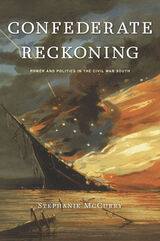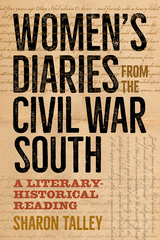
Pulitzer Prize Finalist
Winner of the Frederick Douglass Book Prize
Winner of the Merle Curti Award
“McCurry strips the Confederacy of myth and romance to reveal its doomed essence. Dedicated to the proposition that men were not created equal, the Confederacy had to fight a two-front war. Not only against Union armies, but also slaves and poor white women who rose in revolt across the South. Richly detailed and lucidly told, Confederate Reckoning is a fresh, bold take on the Civil War that every student of the conflict should read.”
—Tony Horwitz, author of Confederates in the Attic
“McCurry challenges us to expand our definition of politics to encompass not simply government but the entire public sphere. The struggle for Southern independence, she shows, opened the door for the mobilization of two groups previously outside the political nation—white women of the nonslaveholding class and slaves…Confederate Reckoning offers a powerful new paradigm for understanding events on the Confederate home front.”
—Eric Foner, The Nation
“Perhaps the highest praise one can offer McCurry’s work is to say that once we look through her eyes, it will become almost impossible to believe that we ever saw or thought otherwise…At the outset of the book, McCurry insists that she is not going to ask or answer the timeworn question of why the South lost the Civil War. Yet in her vivid and richly textured portrait of what she calls the Confederacy’s ‘undoing,’ she has in fact accomplished exactly that.”
—Drew Gilpin Faust, New Republic
“A brilliant, eye-opening account of how Southern white women and black slaves fatally undermined the Confederacy from within.”
—Edward Bonekemper, Civil War News
The story of the Confederate States of America, the proslavery, antidemocratic nation created by white Southern slaveholders to protect their property, has been told many times in heroic and martial narratives. Now, however, Stephanie McCurry tells a very different tale of the Confederate experience. When the grandiosity of Southerners’ national ambitions met the harsh realities of wartime crises, unintended consequences ensued. Although Southern statesmen and generals had built the most powerful slave regime in the Western world, they had excluded the majority of their own people—white women and slaves—and thereby sowed the seeds of their demise.
Wartime scarcity of food, labor, and soldiers tested the Confederate vision at every point and created domestic crises to match those found on the battlefields. Women and slaves became critical political actors as they contested government enlistment and tax and welfare policies, and struggled for their freedom. The attempt to repress a majority of its own population backfired on the Confederate States of America as the disenfranchised demanded to be counted and considered in the great struggle over slavery, emancipation, democracy, and nationhood. That Confederate struggle played out in a highly charged international arena.
The political project of the Confederacy was tried by its own people and failed. The government was forced to become accountable to women and slaves, provoking an astounding transformation of the slaveholders’ state. Confederate Reckoning is the startling story of this epic political battle in which women and slaves helped to decide the fate of the Confederacy and the outcome of the Civil War.

“Traditionally, narratives of war have been male,” Sharon Talley writes. In the pages that follow, she goes on to disrupt this tradition, offering close readings and comparative studies of fourteen women’s diaries from the Civil War era that illuminate women’s experiences in the Confederacy during the war.
While other works highlighting individual diaries exist—and Talley notes that there has been a virtual explosion of published primary sources by women in recent years—this is the first effort of comprehensive synthesis of women’s Civil War diaries to attempt to characterize them as a distinct genre. Deeply informed by autobiographical theory, as well as literary and social history, Talley’s presentation of multiple diaries from women of differing backgrounds illuminates complexities and disparities across female wartime experiences rather than perpetuating overgeneralizations gleaned from a single diary or
preconceived ideas about what these diaries contain.
To facilitate this comparative approach, Talley divides her study into six sections that are organized by location, vocation, and purpose: diaries of elite planter women; diaries of women on the Texas frontier; diaries of women on the Confederate border; diaries of espionage by women in the South; diaries of women nurses near the battlefront; and diaries of women missionaries in the Port Royal Experiment. When read together, these writings illustrate that the female experience in the Civil War South was not one but many.
Women’s Diaries from the Civil War South: A Literary-Historical Reading is an essential text for scholars in women’s studies, autobiography studies, and Civil War studies alike, presenting an in-depth and multifaceted look at how the Civil War reshaped women’s lives in the South—and how their diverse responses shaped the course of the war in return.
READERS
Browse our collection.
PUBLISHERS
See BiblioVault's publisher services.
STUDENT SERVICES
Files for college accessibility offices.
UChicago Accessibility Resources
home | accessibility | search | about | contact us
BiblioVault ® 2001 - 2024
The University of Chicago Press









